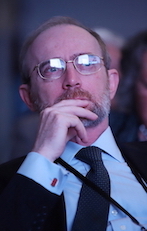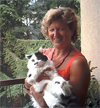Studying at the University of Verona
Here you can find information on the organisational aspects of the Programme, lecture timetables, learning activities and useful contact details for your time at the University, from enrolment to graduation.
Academic calendar
The academic calendar shows the deadlines and scheduled events that are relevant to students, teaching and technical-administrative staff of the University. Public holidays and University closures are also indicated. The academic year normally begins on 1 October each year and ends on 30 September of the following year.
Course calendar
The Academic Calendar sets out the degree programme lecture and exam timetables, as well as the relevant university closure dates..
| Period | From | To |
|---|---|---|
| Sem. 1A | Sep 24, 2018 | Nov 10, 2018 |
| Sem. 1B | Nov 19, 2018 | Jan 12, 2019 |
| Sem. 2A | Feb 18, 2019 | Mar 30, 2019 |
| Sem. 2B | Apr 8, 2019 | Jun 1, 2019 |
| Session | From | To |
|---|---|---|
| Sessione Invernale | Jan 14, 2019 | Feb 16, 2019 |
| Sessione Estiva (Gli esami sono sospesi durante la Sessione di laurea) | Jun 3, 2019 | Jul 27, 2019 |
| Sessione Autunnale | Aug 26, 2019 | Sep 21, 2019 |
| Session | From | To |
|---|---|---|
| Sessione Estiva | Jul 8, 2019 | Jul 13, 2019 |
| Sessione Autunnale | Nov 4, 2019 | Nov 9, 2019 |
| Sessione Invernale | Mar 30, 2020 | Apr 4, 2020 |
| Period | From | To |
|---|---|---|
| Festa di Ognissanti | Nov 1, 2018 | Nov 1, 2018 |
| Festa dell’Immacolata | Dec 8, 2018 | Dec 8, 2018 |
| Vacanze di Natale | Dec 22, 2018 | Jan 6, 2019 |
| Vacanze di Pasqua | Apr 19, 2019 | Apr 23, 2019 |
| Festa della liberazione | Apr 25, 2019 | Apr 25, 2019 |
| Festa del lavoro | May 1, 2019 | May 1, 2019 |
| Festa del Santo Patrono - S. Zeno | May 21, 2019 | May 21, 2019 |
| Festa della Repubblica | Jun 2, 2019 | Jun 2, 2019 |
| Vacanze Estive | Aug 12, 2019 | Aug 17, 2019 |
Exam calendar
Exam dates and rounds are managed by the relevant Humanistic Studies Teaching and Student Services Unit.
To view all the exam sessions available, please use the Exam dashboard on ESSE3.
If you forgot your login details or have problems logging in, please contact the relevant IT HelpDesk, or check the login details recovery web page.
Should you have any doubts or questions, please check the Enrollment FAQs
Academic staff
 claudia.annechini@univr.it
claudia.annechini@univr.it
 linda.napolitano@univr.it
linda.napolitano@univr.it

Pozzo Riccardo
 riccardo.pozzo@univr.it
riccardo.pozzo@univr.it
 +390458028053
+390458028053
 nicola.righetti@univie.ac.at
nicola.righetti@univie.ac.at
Study Plan
The Study Plan includes all modules, teaching and learning activities that each student will need to undertake during their time at the University.
Please select your Study Plan based on your enrollment year.
2° Year activated in the A.Y. 2019/2020
| Modules | Credits | TAF | SSD |
|---|
| Modules | Credits | TAF | SSD |
|---|
| Modules | Credits | TAF | SSD |
|---|
Legend | Type of training activity (TTA)
TAF (Type of Educational Activity) All courses and activities are classified into different types of educational activities, indicated by a letter.
Philosophy of Arts and Music (2018/2019)
Teaching code
4S007339
Teacher
Coordinator
Credits
6
Language
Italian
Scientific Disciplinary Sector (SSD)
M-FIL/04 - AESTHETICS
Period
Sem. 1A, Sem. 1B
Learning outcomes
The course intends to deepen the conceptual, methodological and cultural instruments necessary in order to analyse and interpret a art works. The course also aims at the understanding of the logics and the conceptual structures and at the capacity to use a precise and adequate language; thus, it intends to make the students acquire the competences to form autonomously a critical judgement and to express it adequately.
Program
Nothing is funnier than unhappiness, nothing is more grotesque than the tragic. Philosophical logic and artistic experience: Samuel Beckett – art music theatre
1. During the course we intend to investigate the relationships, especially the conflicting ones, between logic - formal, analytical, but also dialectic - and artistic experience that then leads to creation. In this sense, some works by Samuel Beckett will be analysed. We will begin with the juvenile essay on Proust in which not only a profound critique of logic is elaborated, but also the relationships between the concepts of voluntary memory and involuntary memory, intellect and sensitive perception, time, habit and death.
2. Subsequently, some ways in which these elaborations are translated into theatrical compositional procedures will be examined. Thus we will read and comment Waiting for Godot, as regards the grotesque of the tragic, and then Endgame, as regards the funny aspects of unhappiness. In addition, the artistic aspects (in the sense of the figurative arts) and music in the theatrical style of Beckett will be underlined.
3. These last aspects also connect the course to some theatrical and musical events that will take place at the same time in Milan (we intend to organize tickets at a reduced cost and travel to attend some of the events between October and November): The first presentation of the new work of György Kurtág, Samuel Beckett: Fin de partie. Scènes et monologues. Opéra en un acte, on commission of the Teatro alla Scala, the mise en scène of Endgame with Glauco Mauri (production of the Piccolo Teatro) and some concerts of the Milano Musica Festival which this year bears the title György Kurtág. Ascoltando Beckett.
At the terms of the examination, however, the bibliography indicated below is used.
Prior knowledge and skills: It is convenient that the student has taken the Aesthetic exam during the Bachelor Degree Course; otherwise it is advisable to study an Introduction to the subject, for example: Markus Ophälders, Filosofia Arte Estetica, Mimesis, Milano 2008.
Literature:
- S. Beckett, Aspettando Godot, in: Id, Teatro completo, Einaudi-Gallimard, Torino 1994, pp. 1 – 83.
- Id, Finale di partita, in Id, Teatro completo, cit., pp. 85 – 131.
- Id, Proust, a cura di P. Pagliano, SE, Milano 2004.
- T. W. Adorno, Tentativo di capire il Finale di partita, in: Id., Note per la letteratura, Einaudi, Torino 1979 e sgg., pp. 267-308 .
- N. Pasqualicchio, Il sarto gnostico, Ombre corte, Verona 2006.
- M. Ophälders, A che punto siamo della notte?, in: Id, Labirinti, Mimesis, Milano 2008, pp. 11 – 22.
- Id, “Pensa, porco (pausa …)”. La filosofia sul palcoscenico di Samuel Beckett, in: La filosofia a teatro, a cura di A. Costazza, Cisalpino, Milano 2010, pp. 263 – 283.
- Id, Sarà una risata che vi seppellirà, in: L’utopia alla prova dell’umorismo, a cura di Rosalba Maletta, Mimesis, Milano 2018 (forthcoming).
DIDACTIC MODES
The didactic methods adopted are not distinct between attending and non-attending students. They consist of frontal lessons and collective discussions devoted to the transmission and critical examination of concepts and structures of thinking and reflection and their respective application tools to implement theoretical notions in the direction of autonomous critical judgment.
Throughout the academic year, the teacher also holds a regular individual Reception at the times indicated on his page (without having to set a specific appointment). However, it is recommended that you consult the messages to be informed of any changes. During the first lesson, attending students will receive the full lesson schedule with the dates and topics discussed. Information on timetables and classrooms is also provided.
The content of books and lessons is adhering to the program.
| Author | Title | Publishing house | Year | ISBN | Notes |
|---|---|---|---|---|---|
| M. Ophalders | A che punto siamo della notte?, in: Id, Labirinti | Mimesis | 2008 | pp. 11 – 22. | |
| S. Beckett | Aspettando Godot, in: Id, Teatro completo | Einaudi-Gallimard | 1994 | pp. 1 – 83 | |
| S. Beckett | Finale di partita, in Id, Teatro completo | Einaudi-Gallimard | 1994 | pp. 85 – 131. | |
| N. Pasqualicchio | Il sarto gnostico. Temi e figure del teatro di Beckett | Ombre corte | 2006 | ||
| M. Ophalders | “Pensa, porco (pausa …)”. La filosofia sul palcoscenico di Samuel Beckett, in: La filosofia a teatro, a cura di A. Costazza | Cisalpino | 2010 | pp. 263 – 283. | |
| S. Beckett | Proust | SE | 2004 | ||
| M. Ophalders | Sarà una risata che vi seppellirà, in: L’utopia alla prova dell’umorismo, a cura di Francesco Clerici, Sara di Alessandro e Rosalba Maletta, Mimesis, Milano 2018, pp. 283-301. | Mimesis | 2018 | Il libro è in stampa. | |
| T. W. Adorno | Tentativo di capire il Finale di partita, in: Id., Note per la letteratura | Einaudi | 1979 | pp. 267 - 308. |
Examination Methods
ASSESSMENT METHODS AND CRITERIA
The assessment of the learning outcomes involves an oral test, during which the issues discussed during the course and studied in the texts will be developed. The exam aims at ensuring knowledge of the topics under discussion and the ability to apply the concepts and logical methodologies to the various issues proposed.
This indivisible oral test is about the whole program; it consists of an interview with the teacher and tries to verify:
- the depth and breadth of the knowledge gained;
- the property of language;
- the ability to systematically connect knowledge;
- analytical and argumentative ability.
The vote is expressed in marks from 18 to 30/30.
ERASMUS students are requested to contact the teacher at the beginning of the courses to agree together the teaching methods and the assessment tests.
Type D and Type F activities
Modules not yet included
Career prospects
Module/Programme news
News for students
There you will find information, resources and services useful during your time at the University (Student’s exam record, your study plan on ESSE3, Distance Learning courses, university email account, office forms, administrative procedures, etc.). You can log into MyUnivr with your GIA login details: only in this way will you be able to receive notification of all the notices from your teachers and your secretariat via email and soon also via the Univr app.
Competenze linguistiche
I crediti formativi universitari relativi alle "Ulteriori competenze linguistiche" (B1 informatizzato se seconda lingua; livello B2 completo se stessa lingua della triennale) possono essere acquisiti in una delle due seguenti modalità:
- iscrizione da parte della/o studente presso il Centro Linguistico di Ateneo (CLA ➔ https://cla.univr.it/it/test-e-certificazioni) per il sostenimento e il superamento delle prove + iscrizione, sempre da parte della/o studente, in apposita lista per la registrazione crediti e registrazione CFU (senza presenza) da parte dell’Università.
Oppure
- equipollenza di certificazioni linguistiche esterne: riconoscimento equipollenza di certificazioni linguistiche esterne (➔ https://cla.univr.it/it/servizi/riconoscimento-delle-certificazioni-linguistiche-esterne).
Gestione carriere
Linguistic training CLA
Internships
Graduation
Documents
| Title | Info File |
|---|---|
|
|
pdf, it, 99 KB, 13/10/23 |
|
|
pdf, it, 101 KB, 10/04/24 |
List of theses and work experience proposals
| theses proposals | Research area |
|---|---|
| Linguaggio e mito in Tolkien | ENGLISH LITERATURE - Critical Theory & Poetics |
| Dialettica del negativo in Meister Eckhart | HISTORY OF PHILOSOPHY - MIDDLE AGES |
| La felicità nel Medioevo | HISTORY OF PHILOSOPHY - MIDDLE AGES |
| Le figure di Eva e Maria in Ildegarda di Bingen | HISTORY OF PHILOSOPHY - MIDDLE AGES |
| IA. Una critica fenomenologica al concetto di Intelligenza Artificiale | The Human Mind and Its Complexity: Cognitive science, psychology, linguistics, philosophy of mind - Philosophy of science, epistemology and logic |
Practical information for students
Documents
| Title | Info File |
|---|---|
|
|
pdf, it, 325 KB, 02/05/23 |
|
|
pdf, it, 212 KB, 02/05/23 |
|
|
pdf, it, 131 KB, 02/05/23 |





















